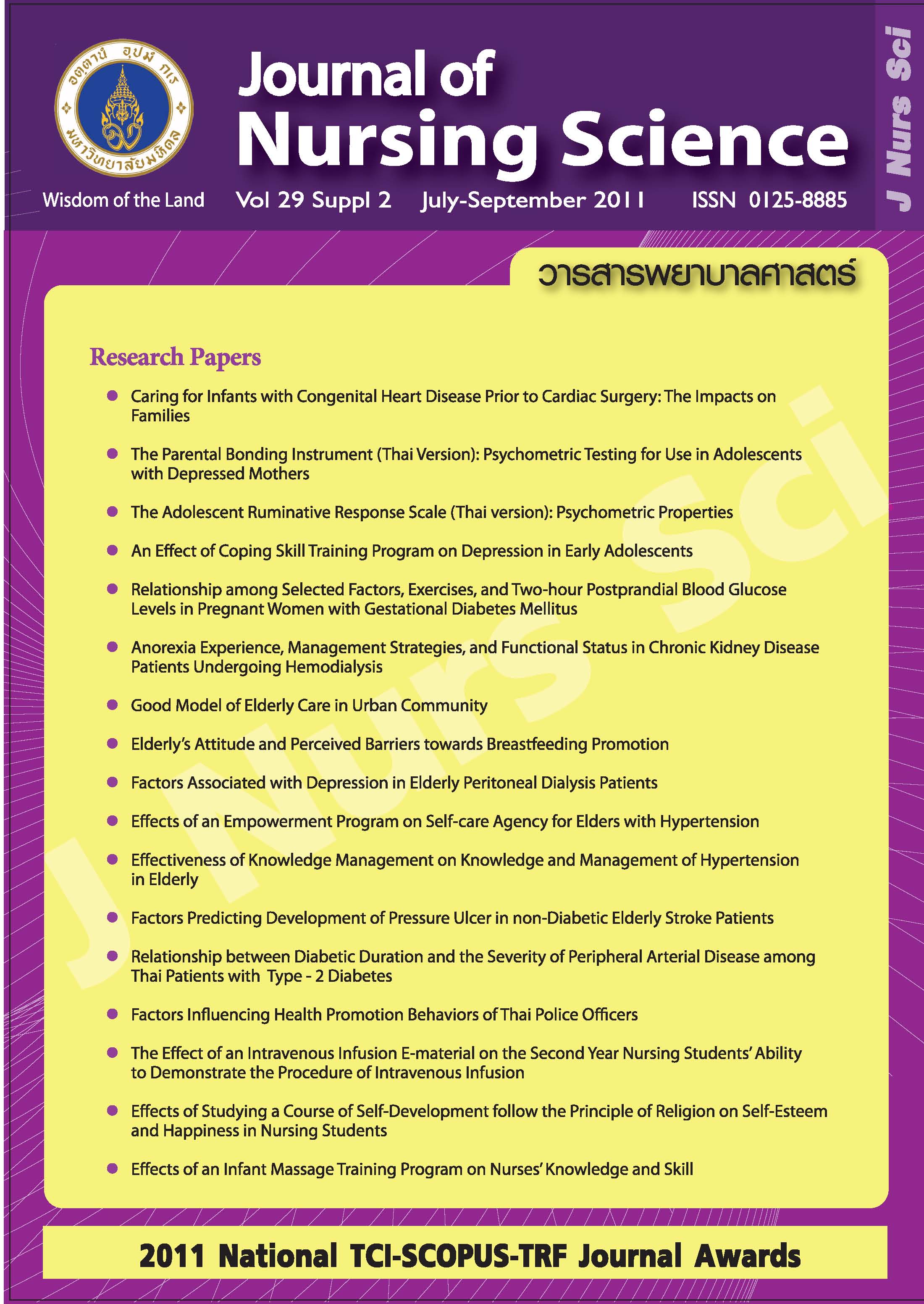Elderly’s Attitude and Perceived Barriers towards Breastfeeding Promotion
Main Article Content
Abstract
Purpose: Elderly are very influential persons in promotingbreastfeeding. The purpose of this study was to determineelderly’s attitude and perceived barriers towards breastfeedingpromotion. Comparisons of their attitudes and perceived barriersamong different genders and age groups are also examined.
Design: A comparative descriptive design.
Methods: The study subjects were member of the HealthPromotion in Elderly Project, Faculty of Nursing, MahidolUniversity. The sample consisted of 75 elderly who were 60 yearsof age or over and able to read and write Thai. Data werecollected using a set of self-administered questionnaires.Descriptive statistics and t-test were used for the data analysis.
Main findings: Nearly half (43.8%) of the elderly highlypromoted breastfeeding while 28.8% rarely or never. Almost half(48%) reported their efficacy in promoting breastfeeding as highto very high levels. An average of attitude score towardsbreastfeeding promotion was 3.10 (SD = 0.26) with a range from1-4. The attitude was not statistically different between men andwomen (t (73) = - .072, p > .05), and between younger (≤ 70years of age) and older (> 70 years of age) groups (t (73) = .793,p > .05). Average score of perceived barriers was 2.39 (SD = 0.56)with a range from 1-4. The statistically significant difference intheir perception of barriers was not found between men andwomen (t (69) = -1.889, p > .05), but between the younger andthe older groups (t (69) = -2.554, p < .05). That is, the older theywere, the more barriers they perceived.
Conclusion and recommendations: The findings suggest that topromote elderly volunteers in “talking” about breastfeeding, it isessential to raise their confidence, especially those who are over70, with regard to self-worth of being an elderly, and educatethem to have precise and updated knowledge of breastfeeding aswell as effective communication with a new generation.
Article Details
Copyright Notice: Nursing Science Journal of Thailand has exclusive rights to publish and distribute the manuscript and all contents therein. Without the journal’s permission, the dissemination of the manuscript in another journal or online, and the reproduction of the manuscript for non-educational purpose are prohibited.

Disclaimer: The opinion expressed and figures provided in this journal, NSJT, are the sole responsibility of the authors. The editorial board bears no responsibility in this regard.
References
Britton C, McCormick FM, Renfrew MJ, Wade A, King SE. Support for breastfeeding mothers. Cochrane Database of Systematic Reviews. 2007;(1), CD001141.
Poltree P. Factors influencing the duration of breast feeding in Sakonnakhon province (Thesis). Bangkok: Mahidol University; 1998. 135 p.
Patanapongthorn J, Jateprayuk S. Breastfeeding rate and factors influencing 4- month exclusive breastfeeding: Research report. Nonthaburi: Health Promotion Division, Health Department; 2004.
Olayemi O, Aimakhu CO, Bello FA, Motayo VO, Ogunleye AA, Odunukan OW, et al. The influence of social support on the duration of breast-feeding among antenatal patients in Ibadan. J Ob Gyn. 2007;27(8):802-5.
Robertson E, Grace S, Wallington T, Stewart DE. Antenatal risk factors for postpartum depression: A synthesis of recent literature. Gen Hosp Psychiatry. 2004;26(4):289-95.
Freed GL, Jones TM, Schanler RJ. Prenatal determination of demographic and attitudinal factors regarding feeding practice in an indigent population. Am J Perinatol. 1992;9(5- 6):420-4.
Scott JA, Landers MC, Hughes RM, Binns CW. Psychosocial factors associated with the abandonment of breastfeeding prior to hospital discharge. J Hum Lact.
;17(1):24-30.
Chaemsai P. Effects of continuing spouse involvement in breastfeeding promotion program for working mother on exclusive breastfeeding during first four months.
(Thesis). Bangkok: Mahidol University; 2007. 110 p.
Srisawat S. Effects of promoting grandmothers’ role in providing support for breastfeeding in first-time mothers (Thesis). Bangkok: Mahidol University; 2009. 114 p. 10. Supason R, Vichitsukon K, Wichiencharoen K. Effects of a community health volunteer role promoting program on breastfeeding. J Nurs Sci. 2010;28(2):41-8. (in Thai).
Buakhum O, Sinsuksai N, Serisatien Y, Vichitsukon K. The effect of breastfeedingpromotion program on the rate of 4-month exclusive breastfeeding in first-time mother: Amnatcharoen Hospital. J Nurs Sci. 2007;25(1):62-75. (in Thai).
Triyachot P. Effect of supportive-educative nursing system on breastfeeding ability of first-time post-partum mothers (Thesis). Khon Kaen: Khon Kaen University; 2003. 173 p.
WABA. World Breastfeeding 2011 [cited August 2, 2011]; Available from:http://worldbreastfeedingweek.org/
Heinig MJ. Breastfeeding promotion for generations X and Y: Why the old ways won’t work. J Hum Lact. 2009;25(3):263-5.
Ajzen I. The theory of planned behavior. Organizational Behavior and Human Decision Processes. 1991;50:179-211.
Pender NJ, Murdaugh CL, Parsons MA. Health promotion in nursing practice. 4th ed. Upper Saddle River, NJ: Prentice Hall; 2001.
Fishbein M, Ajzen I. Belief, attitude, intention and behavior: An introduction to theory and research. Reading, MA: Addison-Wesley; 1975.
Bernaix LW. Nurses’ attitudes, subjective norms, and behavioral intentions toward support of breastfeeding mother. J Hum Lact 2000;16(3):201-9.
Cockerham WC. This aging society. 2nd ed. Prentice-Hall, NJ: Upper Saddle River; 1997. 20. Victor CR. Old age in modern society: A textbook of social gerontology. 2nd ed. San Diego, CA: Chapman & Hall; 1994.
Atchley RC. Social forces and aging: An introduction to social gerontology. 7th ed. Belmont, CA: Wadsworth; 1994.
National Statistics Office. A survey of Thai people’s opinion about knowledge and attitudes towards elderly 2011. [cited October 13, 2011]; Available from: http://
www.ryt9.com/s/nso/1148663


